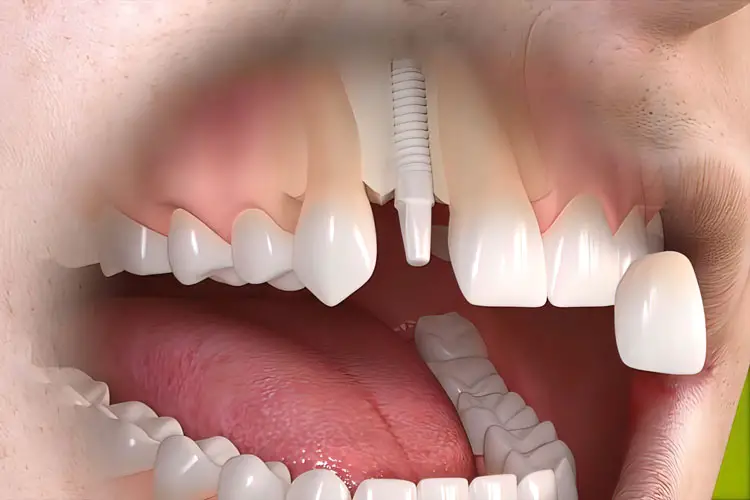Are Ceramic Implants better than Titanium Implants?
Dental implant surgery is a major step toward the perfect smile but it’s not a decision you should make on a whim. It takes careful planning, dedicated research, and a necessary level of trust in your oral surgeon. When it comes time to have the surgery, you’ll need to choose between ceramic and titanium implants. Both materials make sturdy implants but they each have their pros and cons.
Although titanium implants are considered the standard option, they’re less aesthetically pleasing and have a higher risk of allergic reactions. Ceramic, on the other hand, is more biocompatible and harder to spot under a bridge or denture. The only downside is that ceramic implants are less durable and may crack if you are prone to bruxism.
If you are scheduled to undergo dental implant surgery, take a moment to read up on your options. In this guide, we’ll explain the pros and cons of both ceramic and titanium implants and walk you through everything you need to know before the procedure. Speak with your surgeon ahead of time and go into the procedure knowing what to expect.
The Basics of Dental Implant Surgery
Dental implants are small titanium or ceramic posts that are surgically inserted into your jawbone. Once the posts have healed and fused with the underlying bone tissue, they act as a sturdy anchor for your new teeth, which are attached as a bridge, denture, or individual false tooth.
The first step of the surgery is to insert the titanium post into your jawbone. Once the post has healed and fused to your bone, the second step is to attach a small abutment. The abutment is a connector piece that holds your new tooth in place. It’s usually made of titanium, ceramic, or gold.
In some cases, the abutment is already attached to the implant when it’s inserted. In other cases, the abutment is placed after the implant has healed. Once the abutment is in place, though, your new tooth can be attached. The tooth can be made from porcelain, ceramic, or gold, and will be color-matched to your natural teeth and shaped to blend in with your smile.
Ceramic Dental Implants
Ceramic implants are made of a strong, biocompatible material that’s designed to fuse with your jawbone. They’re made of porcelain, zirconia oxide, or alumina, which are both white, tooth-colored materials. This makes them a popular option for patients hoping for a seamlessly white smile.
Additionally, several studies have found that ceramic implants are less susceptible to plaque build-up, making them hardier against inflammation and allergic reactions. This is especially beneficial in the early stages of post-op care when the implant is more likely to be rejected by the body.
The downside to ceramic dental implants, though, is that they are far less durable than titanium. Although they have improved in recent years, ceramic dental implants have largely been relegated to single-tooth implants. They are not strong enough to support an entire bridge or denture. Furthermore, they are more likely to break under the pressure of bruxism (tooth grinding).
Titanium Dental Implants
Titanium implants are made of a strong, durable metal that’s designed to fuse with your jawbone. They’re the most common type of implant and have long been considered the standard option for extensive implant surgeries. Titanium is more durable than steel and won’t corrode when exposed to moisture or oxygen. This makes it a wonderful material for replacing boney structures within the body, such as jawbone tissue.
Unlike ceramic implants, titanium is well suited to withstand the pressures of chewing, as well as mild bruxism. It is, however, advised that you wear a mouthguard if you’re particularly prone to teeth grinding at night. Nevertheless, these implants are strong enough to support an entire bridge or denture and you’ll most likely receive this option if you need to replace multiple missing teeth.
There are a few downsides to titanium implants, though. For example, the metal material is more susceptible to plaque build-up and can promote inflammation if not cared for properly. Additionally, some people may be allergic to titanium, causing the body to reject the implant shortly after surgery. In this case, surgeons must go back in a replace to implant with a different material.
How to Choose Between Ceramic and Titanium Implants
In most cases, the circumstances of your oral surgery will dictate which style of implant you receive. Since ceramic implants are not strong enough to support an entire bridge or denture, they are generally restricted to single-tooth implants. Therefore, if you’ve lost an entire row of teeth, you won’t have many options besides titanium implants.
If you are replacing a single tooth, though, you may request a ceramic implant to create a seamless, bright smile. Speak with your surgeon and see if they approve of the decision. They will likely judge whether you’re a suitable candidate based on how much your grind your teeth and the location of your implant.
How Long Do Titanium and Ceramic Implants Last?
Both titanium and ceramic implants should last you a lifetime with proper care. These materials are designed to fuse with your jawbone and act as a sturdy support for your new teeth. As long as you brush and floss regularly and visit your dentist for routine check-ups, your implants should last for decades.
It’s important to note that your new teeth may not last as long as the implants themselves. The average lifespan of a dental crown is about 10 years but this can be extended with proper care. Make sure to brush and floss around your new teeth just as you would with your natural teeth.
Additionally, try to avoid chewing on hard objects (ice, hard candy, etc.) and limit your intake of sugary and acidic foods and drinks.
The Bottom Line
Dental implant surgery is a major decision that should be made with the help of a qualified oral surgeon. In most cases, titanium implants are the best option but ceramic implants are becoming increasingly popular. Before you undergo implant surgery, make sure to speak with your surgeon about your options.









